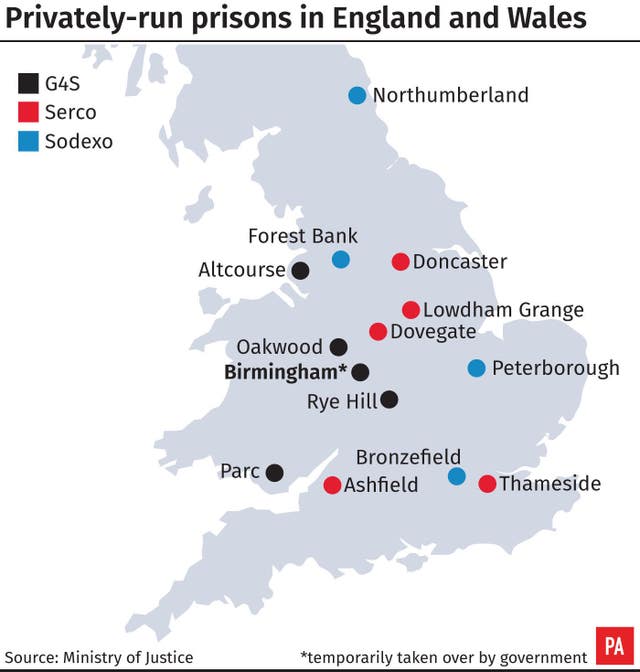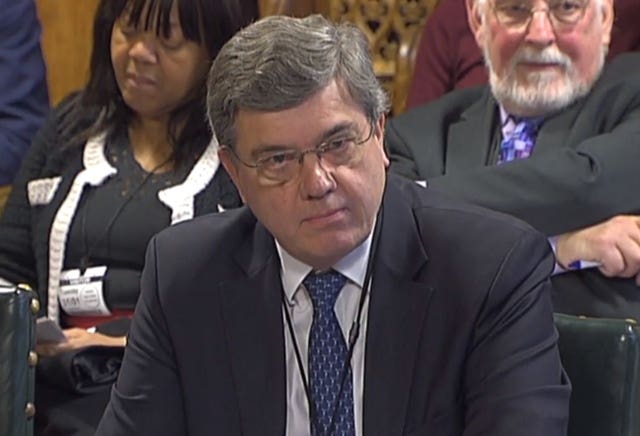Birmingham prison crisis: ‘Somebody must have been asleep at the wheel’
Chief Inspector of Prisons Peter Clarke lamented ‘institutional inertia’ as he published a devastating assessment of the jail.

The prisons watchdog has accused the Ministry of Justice of failing to stop one of the country’s largest prisons slipping into crisis.
Peter Clarke suggested “somebody must have been asleep at the wheel” for conditions at HMP Birmingham to deteriorate so drastically.
Mr Clarke, the chief inspector of prisons, lamented “institutional inertia” as he published a devastating assessment of the jail.
His report said staff were found asleep or locked in offices during an inspection that uncovered “appalling” squalor and violence.
Some inmates were so frightened they reported feeling unsafe behind locked cell doors – while violent prisoners could act with “near impunity”.
Many staff felt fearful and unsafe after a number of incidents, including an arson attack that destroyed nine vehicles in a car park.
Mr Clarke’s inspection team found blatant use of illegal substances went largely unchallenged amid a “looming lack of control”.
At one point, staff were said to have shrugged when inspectors pointed out that drugs were being smoked.
As Mr Clarke’s findings were revealed, the MoJ confirmed it has taken control of the privately-run jail after ministers concluded “drastic action” was required.
Speaking on Monday, the chief inspector said:“How is it that in 18 months a prison which is supposedly being run under the auspices of a tightly-managed contract, how has that been allowed to deteriorate?
“There are Ministry of Justice officials on-site permanently, and yet somehow there seems to have been some sort of institutional inertia that has allowed this prison to deteriorate to this completely unacceptable state.”
Asked whether the MoJ had failed, Mr Clarke told BBC Radio 4’s Today programme: “I think that’s the only reasonable conclusion you can come to.”
He added: “It cannot be the case that the only time urgent action is taken to restore decency in a prison is when an inspection report is published, surely somebody must have been asleep at the wheel?”

From Monday HM Prison and Probation Service took over the running of the jail from G4S for an initial six-month period.
Following the highly unusual intervention, an HMPPS governor has taken charge, an initial 30 extra officers are to be deployed to bolster staffing levels, and the jail’s capacity is being reduced by 300 places.
The Government, which has stressed there will be no additional cost to the taxpayer, says the action was taken following an “extended period” of working with G4S in an attempt to drive up standards at the jail.
Multiple “improvement notices” have been issued this year, according to the MoJ.
It said steps had already been taken to reduce the capacity, re-balance the population and provide additional funding for body-worn cameras, drug detection equipment and netting.
Acknowledging that it was a “shocking” situation, Prisons Minister Rory Stewart said: “This is partly the responsibility of me as the Prisons Minister, of the Government and also of G4S, which is why we’ve taken the step of moving in, bringing in our own management team and reducing the prisoners.”
He told Today that the take-over announced on Monday followed negotiations with G4S through last week.
Mr Stewart added: “That comes on the end of an enormous amount of work that we’ve done over the last few months.”
Downing Street backed G4S to run prisons despite the problems in Birmingham, citing its work at other facilities including HMP Oakwood in Staffordshire.
As the fallout continued, it also emerged that an official investigation concluded that a riot at the prison in 2016 “could and should have been prevented”.
The report on the disturbance, released by the MoJ under freedom of information rules, said staff had become “worn down” by chronic staffing shortages and had “gradually relinquished authority” to the prisoners who were “in effect policing themselves for much of the time”.

After an unannounced inspection at HMP Birmingham concluded earlier this month, Mr Clarke triggered the “urgent notification” scheme to alert the Government to his findings.
Labour leader Jeremy Corbyn said the crisis “shows just how shortsighted the policy is of privatising services”, while shadow chancellor John McDonnell said: “Tory privatisation is now putting the public in danger.”
G4S, which has run the jail since October 2011, welcomed the six month “step-in”, saying the well-being and safety of prisoners and staff is its key priority.
The firm said the prison faces “exceptional challenges” including “increasingly high levels of prisoner violence towards staff and fellow prisoners”.
Steve Gillan, general secretary of the Prison Officers Association, said the announcement is “no reflection” on its members at Birmingham and across England and Wales.

He said: “They have been placed in an unacceptable position by failed Government policies and now once again it will be brave prison officers and related grades picking up the pieces.”
The Prison Governors Association said HMP Birmingham has been “one of the most challenging” in the system for years, irrespective of whether it was run by the private or public sector.
Built in 1849, HMP Birmingham is a category B facility for adult male inmates and had a population of 1,269 at the end of last month.





